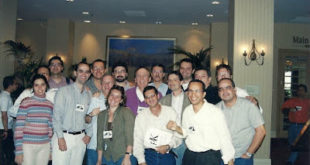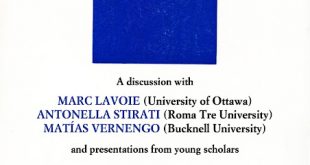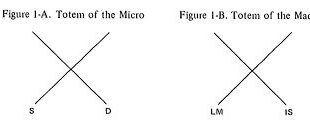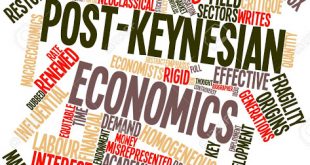Like John Stuart Mill, I´m more interested in credit than in money. Developments in the amount of credit provided are much more instructive to the economist than data on money. Look at the graph below (no. 2 in the ECB press release) , a highly Post-Keynesian graph that originated from the pre-Euro Bundesbank and is now published by the European Central Bank. It shows that money growth in the EU is relatively moderate and, more interesting, caused by a combination of 1) lather large...
Read More »Paul Davidson (1930-2024)
Paul (I'm next to him) and the Brazilians at the UMKC, PK Conference in 2002Paul has passed away a few days ago. He wasn't in good shape for a while, and this was expected. He lived a long and productive life. I wasn't personally close to him, even though I met him several times from the mid-1990s onward. He went to two conferences I co-organized at the Federal University in Rio, always with Louise, which was a central figure of Post Keynesian (PK) life, and basically run the Journal of Post...
Read More »JERZY OSIATYŃSKI 1941-2022
By Jan Toporowski*Jerzy completed his matriculation at Juliusz Słowacki Liceum in Warsaw and went on to study economics in the elite foreign trade faculty of the Main School of Planning and Statistics (Szkoła Główna Planowania i Statystyki SGPiS – now reverted to its pre-War name of the Main School of Commerce Szkoła Główna Handlowa). He completed his PhD there and by then had fallen into the circle of economists around Michał Kalecki, who lectured on the economics of capitalism and convened...
Read More »On Garegnani’s contributions to economics
[embedded content]My initial comments at the seminar on the legacy of Pierangelo Garegnani's contributions to economics organized by the Italian Post Keynesian Network. The full seminar here.
Read More »Garegnani: Ten Years After
This event organized by the Italian Post Keynesian Network. I wrote about Garegnani's contributions when he passed away here in the blog. We will discuss some of the issues he raised, but also the new directions of Sraffian economics.
Read More »Life among the Econ: fifty years on
By Thomas Palley (Guest blogger)Almost fifty years ago, the Swedish econographer Axel Leijonhufvud (1973) wrote a seminal study on the Econ tribe titled “Life among the Econ”. This study revisits the Econ and reports on their current state. Life has gotten more complicated since those bygone days. The cult of math modl-ing has spread far and wide, so that even lay Econs practice it. Fifty years ago the Econ used to say “Modl-ing is everything”. Now they say “Modl-ing is the only thing”. The...
Read More »PKES webinars: Post-Keynesian economics and developing countries
22 Apr 2021 None –27 May 2021 NoneThe Global Financial Crisis of 2008 and the COVID pandemic that erupted in 2020 have reinforced criticisms of the main, orthodox current economic theory. At the same time, they highlighted the need for and importance of alternative approaches such as Post-Keynesian Economics (PKE). The Post-Keynesian Economics Society (PKES) is an initiative that fosters research and dissemination within the framework of PKE. Furthermore, PKES is committed to working towards...
Read More »Godley versus Tobin on Monetary Matters by Marc Lavoie
[embedded content] The 4th Godley-Tobin Lecture given by Marc Lavoie, a co-author of Wynne Godley, and one of the leading Post Keynesian authors.
Read More »Reflections after the Post Keynesian Economics Workshop
By Santiago Graña Colella (Guest blogger)During my bachelor’s degree, I have little access to heterodox literature. What is worst, in most subjects, it was explained that the economy works in a particular fashion everywhere and every time, but without stating that this way was one interpretation of the economy, particularly the neoclassical interpretation. Consequently, most students do not know many alternatives to the economic theory thought to them and after five years (in Latin America)...
Read More »Mainstream Economics/Sold Out?
I recently taught a short workshop (online) on Post Keynesian Economics (PKE) for Summer Academy for Pluralist Economics. I basically discussed the definitions of heterodox and Post Keynesian economics, and some critical issues in the theory of output, employment, money and inflation, and income distribution and growth. Students were from several countries, backgrounds, disciplinary fields and stages in their academic careers (from undergraduates to PhD candidates). I will post some brief...
Read More » Heterodox
Heterodox






